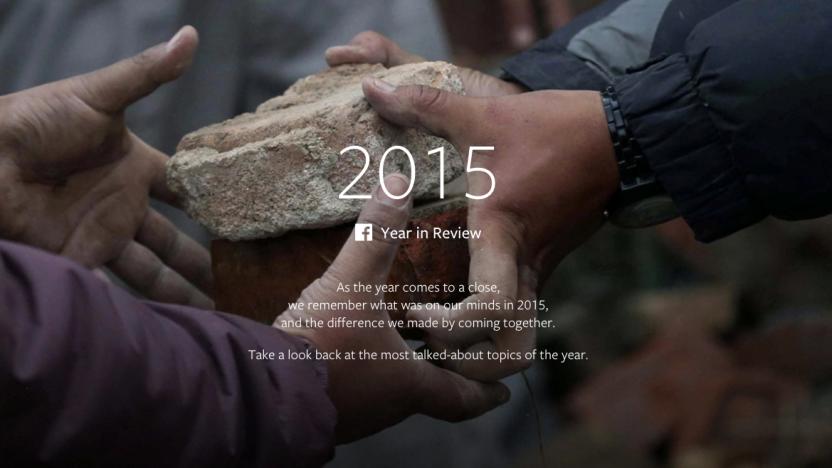ISIS
Latest

Google to push anti-ISIS ads in extremist search results
If you find yourself doing a Google search for terms related to Islamic extremism, you might soon see anti-ISIS ads persuading you to pursue a different path. According to a report written by The Guardian, Google is using its AdWords program to serve up counter narrative advertising from select non-profits whenever anyone enters in search terms that are related to ISIS or Islamic radicalization. Google says even though it'll surface those ads more prominently, that it won't redirect users or change the search results.
Nicole Lee02.04.2016
Facebook's Sandberg says a 'like' attack can help fight ISIS
One way to combat terrorist organizations such as ISIS on the internet, according to Facebook COO Sheryl Sandberg, could be to engage in a so-called "like" attack. At a panel on the World Economic Forum in Davos this week, Sandberg gave an example of how German Facebook users "liked" a neo-Nazi Facebook page and then flooded it with positive messages. "What was a page filled with hatred and intolerance was then tolerance and messages of hope," she said in a report written by The Guardian.
Nicole Lee01.21.2016
Woman sues Twitter for allowing ISIS activity on the website
It's pretty well-known that ISIS and its supporters have been using social media to encourage acts of violence, and Twitter seems to be one of their preferred platforms. Now, a woman whose husband was killed when a gunman attacked a police training center in Jordan is suing the microblogging website for allowing ISIS (and sympathizer) accounts to thrive on the website. According to The Wall Street Journal, the woman's husband was Lloyd Carl Fields, Jr., an American contractor who was slain during the incident that happened on November 9th.
Mariella Moon01.15.2016
Feds tap America's top tech companies to help hunt terrorists
Today, leaders from some of the biggest technology companies in the country met with the US government to discuss ways they might collaborate to help identify and find terrorists on the internet. The massive coalition of companies, including Apple, Facebook, Twitter, Microsoft, Dropbox, YouTube and more met with officials including including NSA director Michael Rogers, White House chief of staff Denis McDonough and FBI director James Comey to discuss ways their technology might help the government battle ISIS. As reported by The Guardian, the tenor of these conversations was perhaps more positive than was first anticipated, leading some to believe that we'll indeed see some collaboration here.
Nathan Ingraham01.08.2016
US leaders meet with tech CEOs to fight terrorism online
The US is determined to knock terrorists offline whenever it can, and it's about to go to great lengths to make sure that happens. Business Insider, the Guardian and the Wall Street Journal understand that some of the country's highest-ranking officials are meeting with the CEOs of internet giants like Apple, Facebook, Google, Twitter and Yahoo to ask for stronger efforts to fight online terrorist activity. And we do mean high-ranking -- the directors of the FBI, National Intelligence and the NSA will be involved, as will the Attorney General and the White House's chief of staff.
Jon Fingas01.07.2016
Anonymous takes credit for cyberattacks crippling Turkey
Apparently, the hacktivists from Anonymous aren't just targeting ISIS directly -- they're causing chaos for indirectly responsible countries, too. The collective is taking credit for an escalating series of cyberattacks that have disrupted banks, internet backbones and government websites in Turkey. The campaign is meant to punish Turkey for allegedly turning a blind eye to activities that fund ISIS' extremism, such as oil smuggling. According to Radware, the attacks have been so fierce that they took down access to 400,000 sites and left Turkey blocking traffic in an attempt to keep sites online.
Jon Fingas12.27.2015
Facebook's 2015 review video puts the year in perspective
One of the internet's greatest achievements is its ability to connect disparate global communities in discussion and, at times, compassion -- and a lot of that conversation takes place on Facebook. The company's Year in Review, a video and list released today, outlines the top 10 stories of 2015, including the US presidential election, Paris terrorist attacks, Syrian civil war and refugee crisis, Nepal earthquakes, Baltimore protests, and marriage equality. It's a snapshot of a year with extreme peaks and valleys, ultimate joy and devastation.
Jessica Conditt12.09.2015
US considers rebranding its anti-ISIS propaganda
According to a report by the Washington Post, the US State Department is considering scaling back its anti-ISIS messaging. The move follows a review from a panel of marketing experts, which included people from both Silicon Valley and New York, that expressed concerns about the agency's ability to provide credible counter arguments against the terrorist organization. The six-member group of experts, with members from both Google and Twitter, not only questioned the US government's tactics, but if it should even be running this type of program in the first place.
Billy Steele12.04.2015
Here's how ISIS tries to keep its online activity a secret (update: debunked)
It's no longer surprising that ISIS uses Telegram's secure messaging to conduct its terror campaigns, but what other tools does it use to keep its online actions under wraps? Thanks to researchers at the West Point military academy, we now have a good idea. They've obtained an ISIS operational security guide that shows the outfit's recommended internet services and software, as well as the policies they're supposed to follow. The extremists are advised to use Tor's anonymity network for browsing, Tails as their operating system and messaging services like Telegram, FireChat or iMessage. They're asked to rely on secure phones like the BlackPhone if they can. They're supposed to avoid both anything that gives away their location (for obvious reasons) as well as Dropbox, whose company-managed encryption theoretically lets governments demand access to cloud storage.
Jon Fingas11.21.2015
Telegram founder knew ISIS was using his service before Paris attacks (updated)
Secure messaging service Telegram announced on Wednesday it had shut down 78 ISIS-related channels since the deadly attacks on Paris and Beirut, alongside a statement saying the company was "disturbed to learn that Telegram's public channels were being used by ISIS to spread their propaganda." This made the situation sound like new information to Telegram -- but that's not the case. At TechCrunch Disrupt in September, Telegram founder Pavel Durov told interviewer Mike Butcher that he knew ISIS used his app (as spotted by The Washington Post). "I don't think we are actually taking part in these activities," Durov said. "I don't think we should be guilty or feel guilty about it." The relevant conversation went down as follows:
Jessica Conditt11.19.2015
Let's have an argument about encryption
Government officials have been vexed for quite some time now that they can't surveil communications that use end-to-end encryption. Never mind that to crack encrypted platforms open for one spy would mean to open them up for all spies. Just being able to roll WhatsApp, Telegram and iMessage into the Pentagon's bulk surveillance programs is good enough for them, thanks. Worrying about what that might mean to the intelligence gathering capabilities of their adversaries is apparently "not in their department."After the devastating attacks in Paris last Friday, U.S. officials wasted no time in using fear to insist that messaging apps using end-to-end encryption be "backdoored" for surveillance access, and rolled into the Pentagon's bulk surveillance programs.The internet, rather than treating the officials like children who want to smash the family piggy bank to collect copper pennies, has decided to argue with them.
Violet Blue11.19.2015
Telegram blocked 78 ISIS messaging channels this week
As details emerged after ISIS' coordinated, deadly attacks on Paris and Beirut last week, one name stood out in conversations about communications channels: Telegram. ISIS operatives use Telegram and other encrypted messaging services to communicate -- a fact that was apparently news to Telegram. In response, this week the company blocked 78 ISIS-related channels in 12 languages. "We were disturbed to learn that Telegram's public channels were being used by ISIS to spread their propaganda," the company writes. Telegram found and blocked the channels based on user-submitted reports.
Jessica Conditt11.18.2015
ISIS' online presence reportedly includes a 24-hour 'help desk'
The terrorist group known as ISIS has ramped up its online outreach efforts in a big way over the past year, including establishing a 24-hour help desk that teaches members how to use encryption and other secure communications tactics, NBC News reports. News of the help desk comes from Dr. Aaron Brantly, a cyber fellow at the Combating Terrorism Center with the US Military Academy at West Point. According to Brantly, ISIS has "developed a series of different platforms in which they can train one another on digital security to avoid intelligence and law enforcement agencies for the explicit purpose of recruitment, propaganda and operational planning."
Jessica Conditt11.17.2015
Anonymous goes to war with ISIS over Paris attacks
In the wake of ISIS' coordinated attacks on Paris Friday night that left 129 civilians dead and scores more injured, the loosely-affiliated hacker collective known as Anonymous announced Sunday the launch of a massive cyber-campaign, dubbed #OPParis, designed to scrub the terrorist organization's influence from the internet while French airstrikes wipe ISIS strongholds off the map. "We can not fight them with guns and rifles," an Anonymous spokesperson told the BBC, "stopping their propaganda is an effective way to weaken their manpower and their presence in the Internet."
Andrew Tarantola11.17.2015
US prosecutes man who hacked identities to help ISIS
Extremism and terrorism are complex things in the internet era, and US federal prosecutors are learning this first hand. The Justice Department recently charged Kosovo citizen Ardit Ferizi with leading a hacking team that swiped the personal data of US military staffers in order to help Islamic State in Iraq and Syria (ISIS) supporters kill as many as 1,000 Americans. That campaign hasn't panned out, as you might have guessed, but it makes the consequences of a typical data breach look timid by comparison.
Jon Fingas11.02.2015
Virginia teen gets 11 years for ISIS support on Twitter
17-year-old Ali Shukri Amin from Virginia will spend the next 11 years and 4 months in a federal penitentiary for his role in running the powerful pro-ISIS Twitter account, @Amreekiwitness. This account collected and disseminated ISIS propaganda to more than 4,000 followers and shared instructions for using Bitcoin to secretly fund the terrorist organization. Amin also admitted to helping one of the account's followers to travel to Syria and join the group. That follower has since been arrested and is facing federal prosecution as well on a conspiracy to provide material support to terrorism charge.
Andrew Tarantola08.28.2015
FBI: Retweeting terrorist organizations could get you arrested
The Federal Bureau of Investigation's least likely informant isn't a shadowy figure in a parking garage or an anonymous phone call -- it's a fast-paced social network with a short attention span: Twitter. According to FBI Director James Comey, the social network has proved to be an invaluable source of evidence against supporters of terrorism. An account that's constantly retweeting content from ISIS or ISIL could be a sign of criminal activity. That said, context still matters.
Sean Buckley08.07.2015
The USAF found and flattened an ISIL base because of selfies
According to Air Force Gen. Hawk Carlisle, a USAF intelligence team with the 361st ISR (Intelligence, Surveillance and Reconnaissance) Group in Hurlburt Field, FL, uncovered a meaty piece of intel during their routine sweeps of Islamic State-related social media accounts. Apparently someone took a selfie outside of a headquarters building and posted it online. Guess what happened next (you read the headline, right?).
Andrew Tarantola06.03.2015
Pro-ISIS hackers take French TV station off the air
A French-language TV station broadcast around the world, was reportedly hacked by ISIS, halting broadcasts for about three hours. TV5Monde's Facebook page and website were also hijacked, and network director Yves Bigot said operations were "severely damaged." The station's programming and Facebook page are back up, but its website remains "en maintenance." As in a recent US hack, the jihadist group used the site to issue threats against French soldiers and reveal the identities of their relatives. France provides air support for anti-ISIS ground forces that recently liberated the Iraqi city of Tikrit, and declared that ISIS must be "wiped out" after the Charlie Hebdo attacks.
Steve Dent04.09.2015
ISIS threatens Twitter employees after account was blocked
Middle Eastern terror group ISIS has apparently threatened the lives of Twitter's employees, as well as that of its chairman, Jack Dorsey. The threat was reportedly made as a response to the service's policy of blocking accounts that directly encourage acts of violence or illegal activities such as terrorism. BuzzFeed has translated portions of the message, part of which reads "when our lions come and take your breath, you will never come back to life."
Daniel Cooper03.02.2015